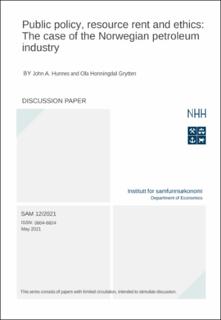| dc.contributor.author | Hunnes, John A. | |
| dc.contributor.author | Grytten, Ola Honningdal | |
| dc.date.accessioned | 2021-05-18T07:16:54Z | |
| dc.date.available | 2021-05-18T07:16:54Z | |
| dc.date.issued | 2021-05 | |
| dc.identifier.issn | 0804-6824 | |
| dc.identifier.uri | https://hdl.handle.net/11250/2755339 | |
| dc.description.abstract | The present paper seeks to explain how ethics and values in public policy can be result of different historical contingencies. Specifically, it explains the accomplishment of petroleum resource management in Norway. The main argument is that the success of this policy is an understanding of the ethics behind harvesting the resource rent of this non-renewable natural resource.
To support the argument, the paper firstly describes a model of Recardian resource rent. Secondly, it investigates the set of values that were in place before the petroleum production started in the 1970s, as described in the influential white paper, “The role of petroleum activities in the Norwegian Society,” published in 1974. In the white paper, the government discussed the future opportunities, challenges, and responsibilities associated with the oil industry and how this would transform society. An important part of the white paper revealed the main ethical vision of the government, i.e., to build a “qualitatively better society” for the benefit of the people. Thirdly, the paper traces the historical roots of these values. | en_US |
| dc.language.iso | eng | en_US |
| dc.publisher | Institutt for samfunnsøkonomi | en_US |
| dc.relation.ispartofseries | DP SAM;12/2021 | |
| dc.subject | resource rent, ethics, economic history, petroleum, oil, governance, public policy. | en_US |
| dc.title | Public policy, resource rent and ethics: The case of the Norwegian petroleum industry | en_US |
| dc.type | Working paper | en_US |
| dc.subject.nsi | Samfunnsvitenskap | en_US |
| dc.source.pagenumber | 17 | en_US |
